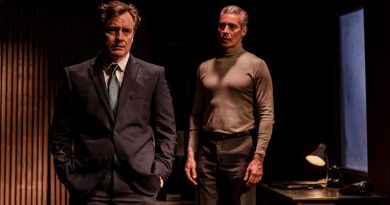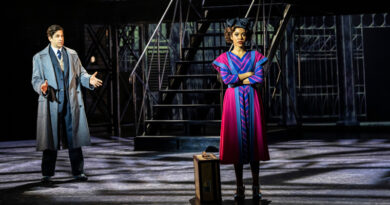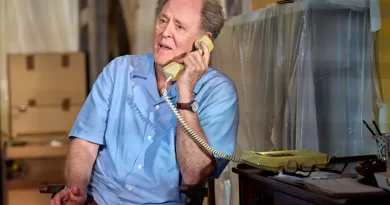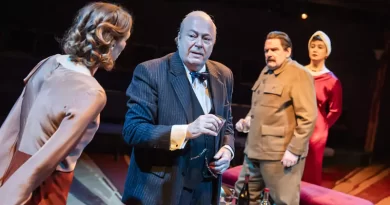“Ich hab (k)ein Heimatland” – Kammerspiele der Josefstadt, Vienna
Ludovico Lucchesi Palli in Vienna
8 November 2022
We know her as an actress, singer, talent agent and activist. In her new one-woman show, Marika Lichter draws on her varied life experience to convey crucial themes. The title translates literally as “I Have No (a) Homeland” and the theme of home territory and belonging is present throughout the entire 90 minutes of the piece.
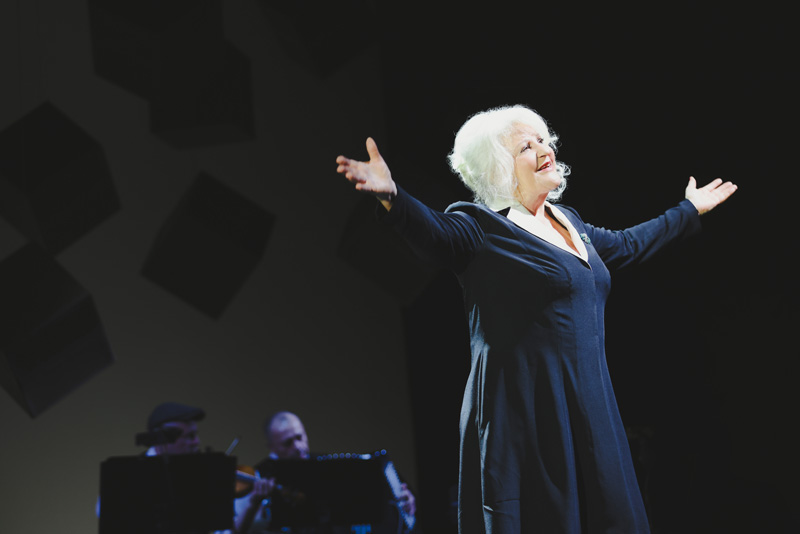
Marika Lichter.
Photo credit: Moritz Schell.
The evening begins with Lichter greeting the audience in such an outgoing, unaffected and relaxed manner it is as almost as if she is not performing in a piece of creative writing. She reveals the genesis of the play which she has created with dramatist and librettist Susanne F. Wolf. It is her way of welcoming spectators into her world and creative process.
Lichter then turns her attention to a box which she has found in the drawer of her late mother’s desk. She recalls that during her childhood, nobody was allowed to open the drawer. Now she knows why. The box, which she found 15 years ago, contains photographs and documents related to her family’s past. There are pictures of people she has never seen before as well as letters and diaries recalling events her parents never talked about. These are the basis of the show, which is split into three parts.
The first part deals with the story of her grandparents. Her grandparents, Edit and Tulli Lichter, were originally from Hungary and Poland. Little is known about her father’s story, but thanks to the box, Lichter finds out about her mother’s past. Her grandfather Paul Spivak was an opera singer in Budapest and was beaten to death on his way home on account of being Jewish. Her mother survived a concentration camp and was reported dead when she suffered meningitis. Luckily an American soldier saved her. These are only two of the many tragic stories the actress has discovered by going through these documents.
The second part deals with her parents who met in Budapest in 1946. This is where Lichter talks about how her parents moved to Vienna when she was a baby and how Vienna, despite their desire to emigrate to the United States or Australia, ended up being home. This is where the theme of “home” and “belonging” is strongest. Lichter recalls that she had a happy childhood in Vienna, but it wasn’t always easy being a Jew. She remembers having friends of Jewish origin but that she wasn’t allowed to see them having told her parents about them.
Her moving family story is enhanced by Yiddish and German songs. There may not have been many people in the room who understood the Yiddish but its intensity was obvious and a sixth sense seemed to help us intuit its relevance.
Highlights of the evening included the uplifting “tschiribim tschiribom”, the sentimental “Unter deinen weißen Sternen” or the song that she sings in the final sequences in which she relates her life in Vienna, the Leopoldi classic “In einem kleinen Café in Hernals ”. She is accompanied by four musicians: Maciej Golebowski on clarinet, Alexander Shevchenko on accorden, Pavel Shalman on violin and Christoph Petschina on double bass. They create a richly patterned sound that works well with the dark atmosphere of the piece.
The sets consist of cardboard boxes on the floor and hanging down from the ceiling, and a screen in the center of the stage which occasionally is used to project photos. There could have been more use of projection which I believe would have added significantly to the evening.
Marika Lichter is an instinctive storyteller to whom the art of recounting her own and other people’s experiences comes naturally. She recounts the story of her family with emotional and factual clarity, without hesitation while also managing to engage audiences from the moment we begin the narratives. Along with Susanne F. Wolf, she has created a piece that should continue to move, educate and inspire.


